|
Arshine Group Co.,Ltd.
|
Specifications
Colistin Sulphate powder
1.Best price and good service
2.Offer the Documents (GMP, DMF ,COA)
3.Prompt shipment
4.Packing:20kg/drum
5.Veterinary medicine antibiotics
Colistin Sulphate powder COA
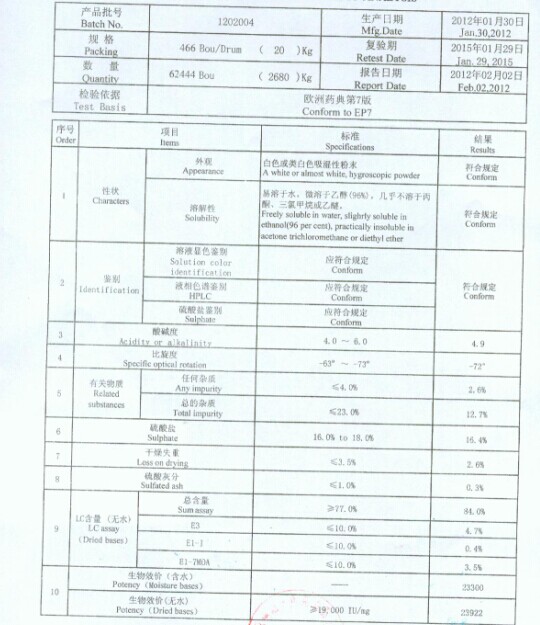
Packaging & Shipping
Colistin Sulphate powder
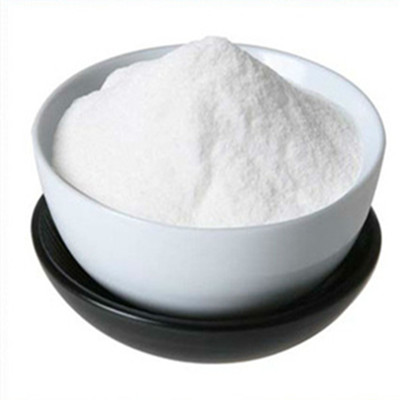
Colistin Sulphate Samples
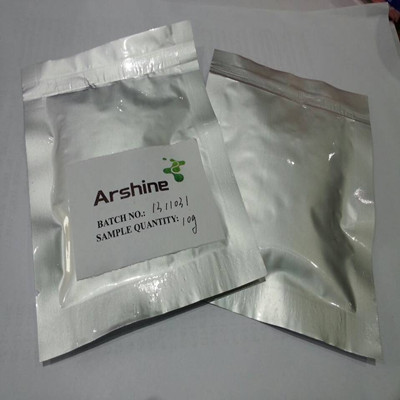
Packaging Detail: 20kgs/Paper Drum or as your require
MOQ: 1 Drum
Delivery Time: 3-7 days after receipt of payment
Colistin Sulphate powder Package
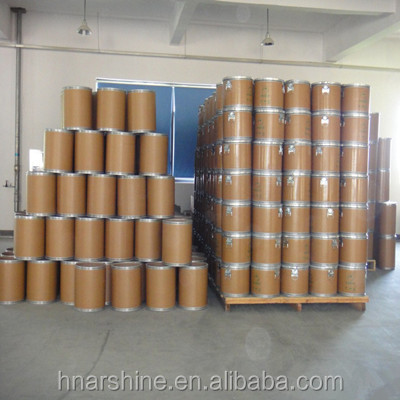
Our Services
Arshine-----Your Always Trusted Pharma Brand
We have more than 450 vendors, Arshine could save your effort to serve customers with supplying all your needs!
Why choose Arshine?
1. We has 8 years’ exporting experience in active pharmaceutical ingredient products.
Our professionaland thoughtful after-sales service eliminates your worries.
2.We can provide you with thousands of products of different levels.
3. We offer convenient one-station purchasing service.
Our team:

Company Information
Arshine is one of the professional suppliers for pharmaceutical raw materials for more than 12 years in China.
Offer Original COA, MOA, GMP, sample and other need documents (to support the registration if you need).
Vendors: NCPC,CSPC, Guo Bang, Zhuhai United, Lv Yuan, Ningxia duowei, Hebei Yu Xing, Jin Xing, Jiheng, Kun Shan, Fengyuan, Jian Ming, XiongDi, Hebei dongfeng etc.
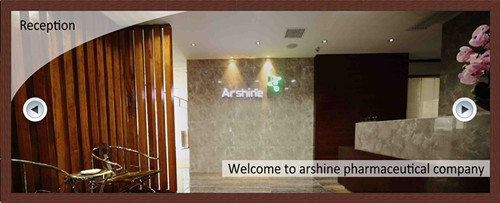   
Our Family
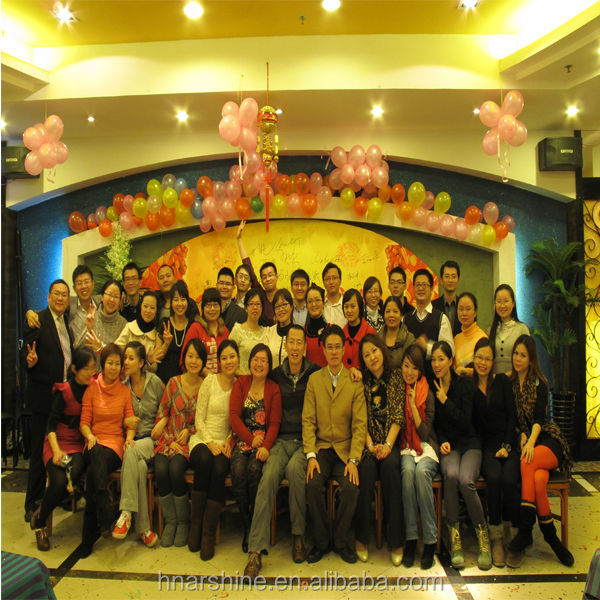
Global Pharma Fairs
 FAQ FAQ
1. How long have your company run on active pharmaceutical ingredients?
12 years focusing on pharma field,8 years exporting experience.
2. Which payment terms are you accept?
Payment term: L/C D/A D/P T/T Western union MoneyGram
3. After an order is placed, when to deliver?
It depends on whether the products you buy has inventory. If we have inventory, generally we can arrange
shipment after receipt of payment 2 to 3 days. If not, it will be decided by the time of the factory production.
4. How about your company's certification?
GMP, FDA, EP, BP etc.
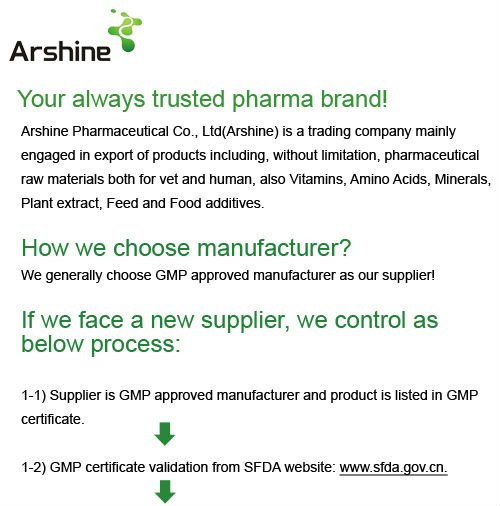 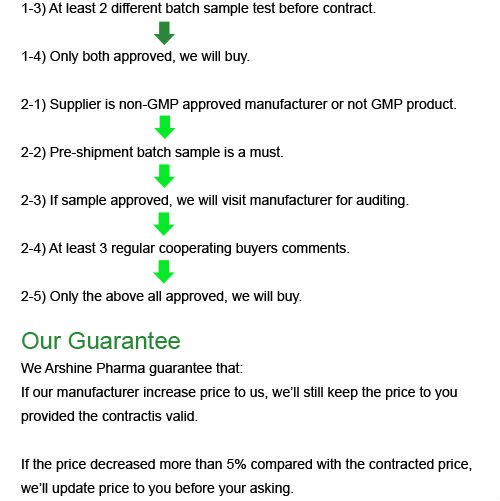
|
Send Inquiry
|
|
Arshine Group Co.,Ltd.
|
Sulfate colistin, also known as colistin, polymyxin E, antibiotics, etc., is a white or nearly white powder, odorless, bitter and hygroscopic, easily soluble in water, slightly soluble in methanol and ethanol, almost insoluble in acetone, ether and other chemicals, and slightly soluble in free alkali in water. Stable within the pH range of 3-7.5. Sulfate colistin is produced by polymyxin and has a strong antibacterial effect on Gram negative bacteria. It is used to treat intestinal diseases caused by Gram negative bacteria, as a feed additive, and has a significant growth promoting effect. It works well when combined with sulfamethoxazole.
Pharmacodynamics
Sulfate colistin belongs to the narrow spectrum fungicide. It has a strong antibacterial effect on Gram negative bacteria such as Escherichia coli, Salmonella, Pasteurella, Shigella, Brucella, Vibrio, and Pseudomonas aeruginosa. Among them, it has a strong bactericidal effect on Pseudomonas aeruginosa and Vibrio. The bactericidal mechanism is to damage the bacterial cell membrane, increase its permeability, and cause leakage of amino acids, purines, pyrimidines, K+, and other substances in the bacterial body. It can also affect the nuclear and ribosomal functions, leading to bacterial death. Bacteria are not easily resistant to this product and have complete cross resistance to polymyxin B. However, there is no cross resistance to other antibiotics. All Gram positive bacteria, as well as Proteus, Brucella, and Serratia, are resistant to this product. Sulfate colistin is mainly used to treat intestinal infections caused by Gram negative bacteria, and for topical treatment of Pseudomonas aeruginosa infections caused by burns and trauma. As a feed drug additive, it has a growth promoting effect.
Pharmacokinetics
This product is rarely absorbed when taken orally, and after absorption, the distribution of the drug in the body is poor, with a short duration. After 8 hours of oral administration, except for bile, there were only trace amounts in other tissues, and after 16 hours, there was no residue in all tissues. After injection, it is widely distributed in the body and reaches its peak in the main tissues within 0.5-1 hours. However, it is not easy to penetrate into the chest cavity, joint cavity, and infection site, and it is also difficult to enter the cerebrospinal fluid. After 6 hours, it cannot be detected except for blood, trachea, salivary glands, kidneys, and urine. After 24 hours, it cannot be detected except for trachea, kidneys, and urine. The protein binding rate of drugs is relatively low. Mainly excreted through the kidneys, it is prone to accumulate in the body when renal function is incomplete.
Antiendotoxin
Endotoxins are a type of toxin synthesized, produced, and released by bacteria, composed of O-specific side chains, core polysaccharides, and lipid A. All antibiotics have the problem of causing bacterial endotoxin release, while colistin sulfate has the lowest bacterial endotoxin release. More importantly, colistin sulfate can neutralize endotoxins by binding positively charged - NH2 to the negatively charged phosphate root on endotoxin lipid A produced by bacteria; Therefore, sulfated colistin can eliminate bacterial endotoxins, inhibit the release and activity of bacterial endotoxins, and is a good anti endotoxin drug. According to research reports by L ü Genfa et al. (2004), once endotoxins bind to receptors on the cell surface and mediate cell activation, colistin sulfate will lose its anti endotoxin effect. Therefore, supporting the direct neutralization effect of colistin sulfate on endotoxins is the main way to antagonize endotoxins.
pharmacological activity
Sulfate colistin has antibacterial activity mainly due to its molecular structure consisting of three key active groups: fatty acids, positively charged amino acids, and cyclic peptides. Missing or changing any of the above structures will significantly reduce their bactericidal activity. Sulfate colistin has a bactericidal effect, mainly as a positively charged free amino group that can bind to negatively charged phosphate ions in the phospholipids of bacterial cells, reducing the surface tension of the bacterial cytoplasmic membrane and disrupting its integrity. This increases the permeability of the cell membrane, causing the main components of the cell, especially purines and pyrimidines, to flow out of the cytoplasm, thereby inhibiting bacterial growth or leading to bacterial death. Due to the high content of phospholipids in the cell membrane of Gram negative bacteria, while the phospholipid content in the cell membrane of Gram positive bacteria is extremely low, the antibacterial effect of colistin sulfate is mainly the strongest against Gram negative bacteria. In view of this, the antibacterial spectrum of sulfated colistin is limited to Gram negative bacteria such as Escherichia coli, Salmonella, Pasteurella, Pseudomonas aeruginosa, and Hemophilus. Moreover, these bacteria typically exhibit widespread resistance to commonly used aminoglycosides, penicillin, cephalosporins, fluoroquinolones, and other antibiotics; Moreover, many bacteria have multiple drug resistance. However, sulfated colistin is not easy to develop resistance, and to date, no resistance has been found against the spread of sulfated colistin resistant plasmids. So, the diffusion and spread of resistance to sulfated colistin is extremely slow, and currently, the vast majority of Gram negative bacteria are quite sensitive to sulfated colistin.
The characteristics of sulfated colistin
(1) Has extremely strong resistance to Gram negative bacteria. Especially, it has a specific developmental inhibitory effect on Escherichia coli, Salmonella, and Pseudomonas aeruginosa.
(2) It has a bactericidal effect. By hindering the selective permeability function of cell membranes, bacteria die
(3) There is almost no issue of drug resistance. No resistance to R factor was found.
(4) Synergistic effect with anti Gram positive bacteria drugs. When used in combination with zinc bacteriocins, aflatoxins, sulfonamides, semi synthetic penicillin, gentamicin, etc., the effect is even better.
(5) No residue. When administered orally, it is almost not absorbed by the intestine, but during intramuscular injection, blood collection and absorption are good, so there is no need to worry about residues in animal products.
(6) Promote the growth of livestock and poultry, and prevent and control infectious enteritis in livestock and poultry.
purpose
It belongs to the class of antibiotics and is used to treat intestinal diseases caused by Gram negative bacteria. It has a certain growth promoting effect and is mainly used for sensitive bacterial infections, such as sepsis, acute enteritis, urinary tract infections, etc. This product is produced by polymyxin bacteria and has a strong antibacterial effect on Gram negative bacteria. It is used to treat intestinal diseases caused by Gram negative bacteria. Sulfate colistin is used to penetrate the cell membrane of bacteria and study the anticoagulation effect of mannose, as well as the antibiotic resistance of certain organisms, such as Baumann. It has also been used to study the hepatotoxicity in rat kidneys, MIC values against Pseudomonas aeruginosa, time killing kinetics, and post antibiotic effects (PAE) |
Send Inquiry
|





 Pharma Sources Insight January 2025
Pharma Sources Insight January 2025


